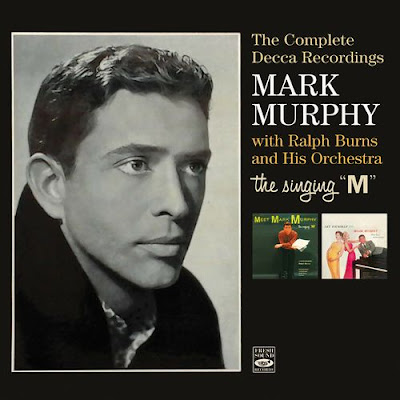Mark Howe Murphy (March 14, 1932 – October 22, 2015) was an American jazz singer based at various times in New York City, Los Angeles, London, and San Francisco. He recorded 51 albums under his own name during his lifetime and was principally known for his innovative vocal improvisations. He was the recipient of the 1996, 1997, 2000, and 2001 Down Beat magazine readers' jazz poll for Best Male Vocalist and was also nominated five times for the Grammy Award for Best Vocal Jazz Performance. He wrote lyrics to the jazz tunes "Stolen Moments" and "Red Clay".
Born in Syracuse, New York, Murphy was raised in a musical family, his parents having met when his father was appointed director of the local Methodist Church choir. He grew up in the nearby small town of Fulton, New York, where his grandmother and then his aunt were the church organists. Opera was also a presence in the Murphy home. He started piano lessons at the age of seven. In his teens, Murphy joined his brother Dwight's jazz dance band as the singer (and occasional pianist), influenced by Peggy Lee, Nat "King" Cole, June Christy, Anita O'Day, and Ella Fitzgerald. The Jazz pianist Art Tatum was another early influence.
Murphy graduated from Syracuse University in 1953, having majored in Music and Drama. Whilst there he was spotted singing at the Embassy Club by Sammy Davis Jr, who invited him to perform a guest spot at his own gig shortly afterwards, and put him in touch with TV host Steve Allen. The following year Murphy moved to New York City, taking part-time jobs as he looked for work as an actor and singer. He appeared in productions for the Gilbert and Sullivan Light Opera Company and a musical version for television of Casey at the Bat. He also twice took second place at Apollo Theatre amateur singing contests.
Murphy was eventually introduced to record producer Milt Gabler, who was an artist and repertoire director (A&R) for Decca. His resulting debut recording was Meet Mark Murphy (1956), followed closely by Let Yourself Go (1957). After disappointing album sales, in 1958 Murphy moved to Los Angeles, where he recorded three albums for Capitol Records, and had a minor hit single with "This Could Be the Start of Something". But this was not enough for him to be retained by Capitol, so he returned to New York in the early '60s.
Here he recorded two albums for Riverside Records: the album Rah (1961) included "Angel Eyes", a version of Horace Silver's "Doodlin'", and "Green Dolphin Street", featuring Bill Evans, Clark Terry, Urbie Green, Blue Mitchell and Wynton Kelly as accompanists. His favorite recording to date, That's How I Love the Blues, soon followed.
In 1963, Murphy hit the charts across the country with his single of "Fly Me to the Moon" and was voted New Star of the Year in Down Beat Magazine's Reader's Poll. Around this time he fell under the spell of Miles Davis, and for the rest of his career maintained that he tried as far as possible to sing like Miles played.
In 1963 Murphy moved to London, England, where he quickly found acceptance and played frequently at Ronnie Scott's Club, as well as making regular appearances on BBC Radio. He recorded three more albums in London, and one in Germany that is amongst his best - Midnight Mood (1968). From London he made frequent trips to Holland, where he worked on Dutch radio, mainly with producer Joop de Roo.
Between 1964 and 1972 he acted in a number of drama productions for TV and radio, and appeared as a singer in the 1967 British comedy film Just Like a Woman. Meanwhile he continued to cultivate his jazz audiences in Europe, singing in clubs and on radio. It was in London that Murphy, who was gay, met his long-time partner Eddie O'Sullivan.
In the UK Murphy's recorded output gained a new lease of life in the mid-Eighties during the acid jazz dance craze. DJ's, principally Gilles Peterson, played his bop and latin recordings at club nights, creating a new generation of Mark Murphy fans. He continued to work extensively in Europe, recording in Germany, Holland, Austria, England, Italy, France, Sweden, Denmark and Slovenia, often as a guest artist.
He recorded an average of an album per year for more than 14 years on the Muse label, ranging from earthy '70s dates with the Brecker brothers to Jack Kerouac tributes complete with spoken word readings to a two-volume Nat King Cole Songbook series. During that period, Murphy was one of the only straight jazz vocalists (other than old-guard names like Sinatra and Tormé) to actually make a living out of his craft. He toured relentlessly as well, and remained as hip a name to drop in 1999 as he was in 1959. After the '90s, Murphy released a handful of albums including Some Time Ago in 2000, Memories of You in 2003, and Love Is What Stays in 2007.
In 2010 he released the independently produced CD, Never Let Me Go, accompanied by pianist Misha Piatigorsky, bassist Danton Boller and drummer Chris Wabich. John Bush at AllMusic.com described Murphy as "a major name in vocal jazz." A long-time resident of the Lillian Booth Actors Home in Englewood, New Jersey, he died there on October 22, 2015 of complications from pneumonia. He was 83 years old.
(Edited from Wikipedia & AllMusic)









